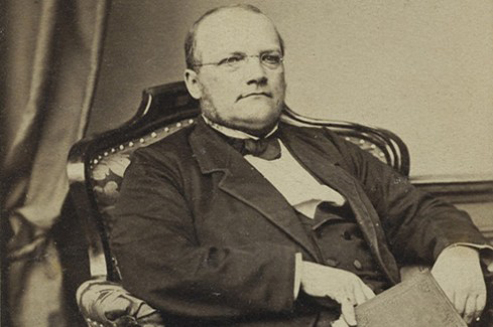“I Was Never an Infant Prodigy”
The father of the National Polish Opera was born in 1819, in the family of an enlightened landowner, who strongly believed in national liberation. He spent his childhood in the quiet and somewhat lethargic atmosphere of the court in Ubiel, near Minsk. He chose the national and patriotic themes for his work when he was a student of Berliner Singakademie, where apart from studying the secrets of counterpoint, harmony and choral conducting, he devoted himself to composing songs from the words of Polish poets. As a goodbye to Berlin Alma Mater, the composer gave his master Carl Rungenhagen a very symptomatic gift – 10 psalms of Mikołaj Gomółka. In 1840, after coming back to his native country, he settled in Vilnius and later married Aleksandra Müller, spending over 32 years by her side, leading a stable life of a faithful husband and father of ten children. An organist of many years and provinces, the indefatigable promoter of musical life in the Eastern block is also the author of naively simple, religious compositions and modest songs full of grace, which he conscientiously collected and published in “Śpiewnik domowy” (Songbook for Home User) throughout his life, so that they would “shape the musical taste of the Polish nation.”
Perhaps it would never have changed if Moniuszko did not become familiar with the national opera. The first Vilnius premiere of two-act opera Halka did not bring the expected reaction. To reap his laurels and to receive the nickname of the “Father of Polish National Opera”, he had to wait for over 10 years. Thoroughly remade and extended by two more acts, Halka was played in 1858 in the Grand Theatre of Warsaw, and its euphoric acceptation brought the author’s life to a turning point. He got promoted from a provincial organist to a general manager of the greatest theatre in Poland back then, which made him an undisputed dictator of musical trends. Although he spoke of the opera negatively, seeing it as “complete absurdity”, eventually it became the perfect medium for him to express the national idiom. The next 8 operas and 6 operettas revealed his precious mind and great sense of satirical humour. The premiere of another nation-wide four-act opera, the Straszny Dwór in January 1865, ended with a big patriotic demonstration, forcing the tsarist censorship to take the play off the billboards.
Burdened with an excess of work and weak health, while struggling with financial problems and the envy of people from his musical environment, Moniuszka died early on the 4th of June in 1872, after only 53 years on this planet. His funeral became a patriotic demonstration, with over 70,000 participants showing their respect towards the musician and what he accomplished.
Violated Sanctity
The requirement of patriotic correctness is to love the national sanctity. Unfortunately, this requirement cannot shade the fact that the creation at the service of specific ideologies connected with a particular period, will inevitably be received with difficulty. Moniuszo’s music is marked by partitions, longing for liberty and nostalgic recalling of Polish backwaters. A second problem with Moniuszko was that he focused only on Polish matters. This had two consequences; on one hand, he became a very popular and respected man in Poland, while on the other hand, it was impossible for him to conquer the world. When he went to Paris in 1861 hoping to stage some of his operas, it eventually ended with a meeting with Polish emigrants. Paris did not give way to the charm of national expression by Moniuszko. He appeared to be too exotic and too shy to conquer the cultural capital of the world. Moreover, Polish exoticism was no longer a gracious topic, and stopped being popular after the annexation. It was seen as an odd country with unclear resentments. The love for Chopin has gone into oblivion. But Chopin was half French, he lived in Paris, and composed truly universal music. In addition, he was charismatic and he could enrapture the salons. So what could the unattractive Moniuszko do?
And that is how it stayed. The works of the father of the Polish opera have not entered into the regular repertoire of global opera theatres and they probably never will. By now it has been difficult to promote Moniuszka. The attempts made by Polish musicians have not brought any success to popularising this sort of music. Even the indefatigable Maria Fołtyn, maliciously nicknamed “Moniuszka’s widow”, had no success although she staged Halka in Cuba, Mexico, Turkey, Japan, Brazil, USA, and even in Novosibirsk, as well as running the Festival of Moniuszko’s Music in Kudowa-Zdrój for many years. She also created the International Moniuszko Competition in Warsaw, where in a moment of weakness she admitted: “I do realize that he is not a prominent composer.”
“What is national shall never stop being liked”
Maybe Moniuszko wasn’t prominent, but his music was still outstanding and didn’t lack melody or grace. It is often associated with ceremonial moments. When the sound of Mazurka begins in Straszny Dwór (The Haunted Manor) or Halka, we feel the thrill of emotions and sometimes of patriotic movement. We are moved by the Prząśniczka (The Spinner), and with no boundaries we get tempted by the story of Dziad i Baba (The Old Man and The Old Woman). So Moniuszko was right, writing the following in his preface to the 1st edition of the famous Śpiewnik Domowy: “That, what is national, what is the memory of our childhood – shall never stop being liked.” Perhaps it is worth to turn a blind eye to the anachronic context of his heritage and to instead associate Moniuszko’s work with its substance? If it is good, it will prove its worth on its own.
Photo © Jan Miecznikowski. Biblioteka Narodowa.
Source: Culture.pl


